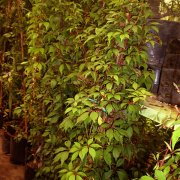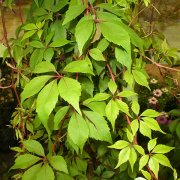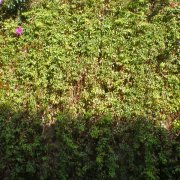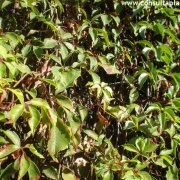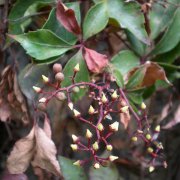Care of the climbing plant Parthenocissus inserta or False Virginia creeper |
|
The genus Parthenocissus, family Vitaceae, comprises 12 species of climbing shrubs native to North America and eastern Asia. Some species are: Parthenocissus inserta, Parthenocissus quinquefolia, Parthenocissus tricuspidata, Parthenocissus semicordata, Parthenocissus henryana, Parthenocissus himalayana. Common names: False Virginia creeper, Grape woodbine, Thicket creeper. This species is native to North America. They are deciduous climbing plants with reddish stems with tendrils that reach 20 meters (65.6 feet) in height. They have glossy leathery leaves with 5 petiole leaflets with serrated edges and deep green color that take on attractive red tones in autumn. The flowers are small and greenish; they bloom in late spring and early summer. They produce dark purple fruits. False Virginia creeper is used as climbing plants to cover walls, fences and pergolas with the help of supports. Parthenocissus inserta grows in sun and semi-shade exposures. It resists frosts down to -25 ºC (-13 ºF). Grape woodbine can grow in any soil but prefer that they contain organic matter and be deep. Transplanting and planting are done in the fall or spring. Water regularly so that the substrate remains cool but not damp (much less waterlogged). Fertilize with compost in winter and with mineral fertilizer in spring. Prune in late fall to control growth. If there is excess watering, Parthenocissus inserta can be attacked by fungi; if it suffers from drought it can be attacked by mealybugs and mites. False Virginia creeper is propagated by tender cuttings in late summer and by woody cuttings in early spring. |
Images of the climbing plant Parthenocissus inserta or False Virginia creeper |
Find plants
Parthenocissus inserta or False Virginia creeper | Care and Growing
© 2026 FavThemes
